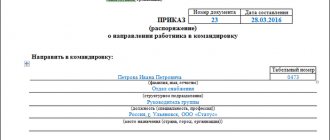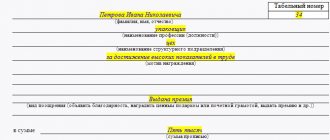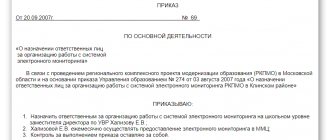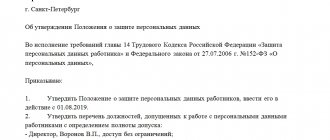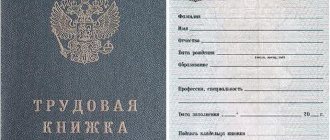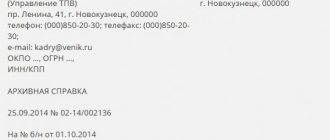Author of the document
| Contract-Yurist.Ru offline Status: Legal company rating460 84 / 6 Private message Order a consultation | number of consultations: |
| noted as the best: | 5 |
| answers to documents: | |
| documents posted: | 927 |
| positive feedback: | |
| negative reviews: |
| APPROVED: By order of the Director OOO "_________________" from "___"__________20__ No. ____ |
Shelf life
Personnel documentation of the enterprise is subject to mandatory storage during the entire period of work. According to the Order of the Ministry of Culture of the Russian Federation dated August 25, 2010, documents on the procedure for granting vacations, duty, business trips, as well as on rewards and punishments for employees, must be in the organization for 75 years.
The order, which introduces adjustments to labor discipline, contains additional information about the rights and responsibilities of employees. It is the legal basis for bonuses or dismissals, therefore, it relates to personnel documents and must be preserved for 75 years. If the company closes before the specified deadline, all personnel records are transferred to state archives.
"On labor discipline"
I. GENERAL PROVISIONS
1.1. These Regulations, based on the labor legislation of the Russian Federation, define special conditions for compliance with discipline by employees of LLC "___________________________" (hereinafter referred to as the Company) and disciplinary measures in case of violation of such conditions.
1.2. This Regulation applies to all employees.
1.3. The discipline of employees consists in their compliance with the order, rules and norms established by the legislation of the Russian Federation, local acts of the Company, as well as the duties stipulated by employment agreements (contracts).
1.4. Employees are obliged:
- conscientiously, at a high professional level, perform their job duties assigned to them by the employment contract and job descriptions;
- timely and accurately execute written and oral instructions from the administration;
- comply with the Internal Regulations;
- comply with labor protection, safety, industrial sanitation and occupational hygiene requirements;
- comply with fire safety rules;
- treat the Company's property with care;
- immediately inform the administration about the occurrence of a situation that poses a threat to the life and health of people, the safety of the Company’s property;
- keep your workplace clean;
- behave with dignity, refrain from actions that interfere with other employees performing their job duties;
- refrain from smoking in areas not specifically designated for this purpose.
The range of duties (work) that each employee performs in his specialty, qualification or position is determined, in addition to the employment contract, by technical rules, job descriptions (job characteristics), developed on the basis of the tariff and qualification directory of works and professions of workers and the qualification directory of employee positions .
1.5. The Company's administration is obliged to:
- comply with labor legislation, local regulations of the Company, and the terms of individual employment contracts;
- provide employees with work stipulated by employment contracts;
- ensure labor safety and conditions that meet occupational safety and health requirements;
- provide employees with equipment, tools, technical documentation and other means necessary to perform their job duties;
- pay the full amount of wages due to employees within the time limits established by the Labor Code of the Russian Federation and the Internal Regulations;
- timely comply with the instructions of state supervisory and control bodies;
- provide for the everyday needs of employees related to the performance of their job duties;
- consider and implement employee proposals aimed at improving the work of the Company, support and encourage the best employees;
- strengthen labor discipline, orient workers to improve the level of work culture;
- ensure proper maintenance of premises; their heating, lighting, ventilation, equipment; create normal conditions for storing workers’ outer clothing;
- monitor compliance by employees with all requirements of safety and fire safety instructions;
- create conditions for increasing labor productivity, improving the quality of work, increasing the role of moral incentives for work;
- improve the business skills of employees;
- promote the creation of a business-like, creative atmosphere in the team, support the initiative and activity of employees;
- carry out compulsory social insurance of employees in the manner established by federal law;
- compensate for harm caused to employees in connection with the performance of their labor duties, compensate for moral damage in the manner and under the conditions established by Russian legislation.
II. INCENTIVES
2.1. Employees are encouraged for conscientious performance of work duties, improving the quality of work, increasing labor productivity, innovation, initiative, ensuring the safety of transported goods and luggage, careful handling of other entrusted property, long-term and impeccable work. The following types of incentives are applied to employees:
- announcement of gratitude;
- issuing a bonus;
- rewarding with a valuable gift;
- awarding the Society's Certificate of Honor;
- placement of an employee's photograph on the Honor Board.
2.2. When applying incentive measures, a combination of material and moral incentives for work is ensured.
2.3. For special labor merits, employees are presented to higher authorities for encouragement, to be awarded medals, certificates of honor, badges and to be awarded honorary titles and the title of best worker in the profession.
2.4. The procedure for encouraging employees:
a) every manager has the right to declare gratitude;
b) incentives are announced in the order;
c) information about employee incentives is brought to the attention of the entire team of the Company;
d) the announcement of gratitude in the order, the issuance of a bonus, the awarding of a valuable gift, a Certificate of Honor are carried out by the manager who has the right to hire this employee. The manager may apply another type of incentive provided for by the collective agreement;
e) a superior manager uses the right of a subordinate manager to reward employees in full.
III. PENALTIES FOR VIOLATIONS OF LABOR DISCIPLINE
3.1. For committing a disciplinary offense, that is, failure or improper performance by an employee through his fault of the labor duties assigned to him, the administration has the right to apply the following disciplinary sanctions:
- comment;
- rebuke;
- dismissal for appropriate reasons.
3.2. Dismissal as a disciplinary sanction can be applied for:
- repeated failure by an employee to perform labor duties without good reason, if he has a disciplinary sanction;
- a single gross violation of labor duties by an employee, in particular:
- for absenteeism, systematic tardiness (absence from the workplace without good reason for more than four hours in a row during the working day);
- appearing at work in a state of alcohol, drug or other toxic intoxication;
- disclosure of trade secrets that became known to the employee in connection with the performance of his job duties. The list of information constituting a trade secret is approved by order of the General Director;
- committing theft (including small) of the Company's property, embezzlement, intentional destruction or damage, established by a court verdict that has entered into legal force or a resolution of a body authorized to apply administrative penalties;
- violation by an employee of labor protection requirements, if this violation entailed serious consequences;
- the commission of guilty actions by an employee directly servicing monetary or commodity assets, if these actions give rise to a loss of confidence in him by the administration;
- the commission by an employee performing educational functions of an immoral offense incompatible with the continuation of this work;
- adoption of an unjustified decision by the head of the Company, his deputies and the chief accountant, which entailed a violation of the safety of the Company’s property, its unlawful use or other damage to property.
Disciplinary action in the form of dismissal cannot be applied to pregnant women. Dismissal of workers under the age of 18 is permitted only with the consent of the relevant state labor inspectorate and the commission for the affairs of minors and the protection of their rights.
3.3. A disciplinary sanction can only be imposed by the head of the Company or a person performing his duties.
3.4. Before applying a disciplinary sanction, the Company's administration must identify the circumstances and reasons that served as the basis for resolving the issue of bringing the employee to disciplinary liability, selecting and applying liability measures to him. In this case, the Company administration must require an explanation from the employee in writing.
If the employee refuses to give the specified explanation, a corresponding report is drawn up within two working days. The act is signed by three persons: the head of the Company or the person performing his duties, and two persons working together with the employee suspected of committing a disciplinary act.
Refusal to give an explanation does not relieve the guilty employee from disciplinary liability.
3.5. The disciplinary sanction must correspond to the severity of the offense committed, the circumstances under which it was committed, and the degree of guilt of the employee.
3.6. When determining the type of disciplinary sanction, the head of the Company or the person performing his duties must take into account the nature of the offense, the harm caused by it, the circumstances under which it was committed, as well as the previous service of the employee who committed the offense and his attitude to work.
When imposing a disciplinary sanction, the rules of professional ethics must be observed and humiliation of the employee’s personal dignity must not be allowed.
3.7. The application of a disciplinary sanction does not relieve the employee who committed the offense from other liability provided for by the legislation of the Russian Federation. For each disciplinary offense, only one disciplinary sanction can be applied
3.8. Disciplinary action is applied no later than one month from the date of discovery of the misconduct, not counting the time the employee was ill or on vacation. The one-month period for imposing a disciplinary sanction must be calculated from the day the misconduct was discovered (the day on which the person to whom the employee is subordinate for work (service) became aware of the commission of the misconduct, regardless of whether he was vested with the right to impose disciplinary sanctions).
A disciplinary sanction cannot be applied later than 6 months from the date of commission of the offense.
3.9. An order to apply a disciplinary sanction is announced to the employee against signature within three days from the date of its publication.
If an employee refuses to sign an order issued by the head of the Company or the person performing his duties, then a corresponding act is drawn up. In this case, the employee’s refusal to certify the fact of presenting the order does not affect the validity of the penalty applied.
The act is signed by three persons: the head of the Company or the person performing his duties and two persons working together with the Employee suspected of committing a disciplinary offense.
3.10. In the case where the offense is of a continuing nature and the employee, despite the application of a disciplinary sanction, does not stop actions that violate labor discipline, and failure to perform or improper performance due to the fault of the Employee of the labor duties assigned to him continues despite the imposition of a disciplinary sanction, then the head of the Company or the person performing his duties, has the right to apply a new disciplinary sanction to him, up to and including dismissal.
3.11. If within a year from the date of application of the disciplinary sanction the employee is not subjected to a new disciplinary sanction, then he is considered to have no disciplinary sanction, but this does not entail the reinstatement of employees who have been relieved of their position or dismissed in accordance with labor legislation.
3.12. The head of the Company, before the expiration of a year from the date of application of a disciplinary sanction, has the right to remove it from an employee on his own initiative, at the request of the employee himself (set out in a written statement), or at the request of his immediate supervisor.
In this case, the person who imposed this penalty issues the appropriate order (instruction), and the employee from whom the disciplinary sanction was lifted early is considered not to have been subjected to disciplinary sanction.
3.13. If the employee has not committed a new violation of labor discipline and has shown a conscientious attitude to work, the disciplinary sanction imposed on him can be lifted before the end of the year.
3.14. An employee, within three months from the date of familiarization with the order imposing a disciplinary sanction on him and within a month from the date of delivery of the dismissal order, may appeal such orders in the manner prescribed by law.
An appeal does not suspend the execution of an order to impose a disciplinary sanction on an employee.
3.15. These Regulations are included in the list of local regulatory acts of the Company and are binding.
Download the document “Regulations on labor discipline”
Basic moments
Special disciplinary Charters and Regulations are most often adopted in those sectors of the economy where strict obedience to the rules is especially important. For example, regulations apply to maritime and river transport and the nuclear industry.
The document establishes the rights and responsibilities of the manager and subordinate; incentive measures for compliance with the regulations and penalties for violating them are listed. The statutes, developed on the basis of federal laws and regulations of the Government of the Russian Federation, contain more stringent and varied types of punishment for disciplinary offenses.
Leave a comment on the document
Do you think the document is incorrect? Leave a comment and we will correct the shortcomings. Without a comment, the rating will not be taken into account!
Thank you, your rating has been taken into account. The quality of documents will increase from your activity.
| Here you can leave a comment on the document “Regulations on Labor Discipline”, as well as ask questions associated with it. If you would like to leave a comment with a rating , then you need to rate the document at the top of the page Reply for |
Common mistakes made by employers
Sometimes employers use a sample order “warning about violation of labor discipline,” but there is no such type of penalty as a warning in the Labor Code of the Russian Federation. This measure can only apply to certain categories of workers whose activities are regulated by special laws. Thus, a warning about incomplete official compliance is applied to civil servants along with the types of punishments established in Article 192 of the Labor Code of the Russian Federation (Law “On the State Civil Service” dated July 27, 2004 No. 79-FZ).
As for such a favorite method of restoring order among staff as fines, this also has its own nuances. Since the fine does not apply to the penalties established in the Labor Code of the Russian Federation, writing off sums of money from an employee is a gross violation of the law, for which the employer can be held accountable. Therefore, it is prohibited to issue orders on fines for violation of labor discipline. However, the legal subtlety lies in the fact that if the disciplinary sanction has not been repaid, the employee may lose part of the bonus, which may be called a “fine” in the internal regulations of the organization. Thus, it is impossible to simply fine an employee - it is necessary to impose a disciplinary sanction, for example, a reprimand, which may entail deprivation of a bonus (if such a condition is contained in a local act, for example, in the bonus regulations).
Comments on the document “Regulations on labor discipline”
Reply 0
| 5 Radostev VI | 03/16/2015 at 12:08:34 Thanks for the document! |
Reply 0
| 4 Victor | 10/07/2015 at 20:28:58 The document is good, but I think it’s not necessary, since all this is in other regulations, PVTR, collective agreement and it makes no sense to overload office work at the enterprise |
Reply 0
| 5 Albina | 03/03/2017 at 14:37:56 Thank you for doing our job!!! |
Reply 0
| Albina | 03/03/2017 at 14:47:07 Thank you for doing our job |
Reply 0
| 5 Catherine | 03/28/2018 at 12:22:45 A very useful document. |
Reply 0
| Diana | 06/06/2019 at 11:20:49 Thank you! useful) |
Found documents on the topic “regulations on labor discipline”
- Regulations on labor discipline Documents of the enterprise's office work → Regulations on labor discipline
... by order of the director of LLC "" dated "" 20 No. Regulations "on labor discipline " i. general provisions 1.1. the present situation , based on the legislation... - Samples of approximate wording of orders and entries in labor books related to discipline labor and other issues regulating labor employee-management relationship
Employment agreement, contract → Samples of approximate wording of orders and entries in work books related to labor discipline and other issues governing the employee’s labor relations with the administrationsamples of approximate wording of orders and entries in work books related to labor discipline and other issues regulating labor relations with the administration of the institution, organization, enterprise...
- Statement of uncollected overdue receivables and settlement violations disciplines according to synthetic accounts
Accounting statements, accounting → Statement of uncollected overdue receivables and violations of settlement discipline on synthetic accountsstatement of uncollected overdue accounts receivable and violations of settlement discipline on synthetic accounts - name, conclusion, date of auditor's action on occurrence, reason, amount at level...
- Position about the form and procedure of conclusion labor contracts
Employment agreement, contract → Regulations on the form and procedure for concluding employment contractsproject “agreed” “approved” chairman of the trade union committee director of the enterprise “” 20 "" 20g. regulation on the form and procedure for concluding labor contracts for (name of enterprise) this regulation was developed in accordance with...
- Sample. Position according to the contract system of hiring and payment labor employees of a joint stock company
Employment agreement, contract → Sample. Regulations on the contractual system of hiring and remuneration of employees of a joint-stock companyRegulations on the contract system of hiring and remuneration of company employees 1. General part 1. This regulation has been developed...
- Minutes of the meeting labor collective for the election of a joint committee (commission) for protection labor and election of an authorized person for the protection labor
Documents of the enterprise's office work → Minutes of the meeting of the labor collective for the election of a joint committee (commission) on labor protection and the election of an authorized person for labor protection...l - secretary - present: man. agenda: 1. elections of a joint committee (commission) on labor . 2. election of an authorized person for labor of the workforce. listened: speaker - director - speak...
- Condition status report labor, benefits and compensation for working in unfavorable conditions labor. Form No. 1 (conditions labor) (Resolution of the State Statistics Committee of the Russian Federation dated July 12, 1994 No. 104)
Statistical reporting → Report on the state of working conditions, benefits and compensation for work in unfavorable working conditions. Form No. 1-t (working conditions) (Resolution of the State Statistics Committee of the Russian Federation dated July 12, 1994 No. 104)...about okpo okdp kopf +- codes are put down by the organization - the report writer +-+ to whom the form n 1-t ( working ) name is submitted, the address of the recipient is approved by the resolution of the State Statistics Committee of Russia dated July 12, 1994 n 104 ministry (department...
- Minutes of the meeting labor collective for the selection of authorized (trusted) persons for security labor
Documents of the enterprise's office work → Minutes of the meeting of the labor collective for the selection of authorized (trusted) persons for labor protectionMinutes No. of the general meeting of the labor collective (name of organization) according to the list of people. person is present at the meeting. story...
- Sample minutes of a general meeting (meeting of authorized representatives) labor collective farm (state farm) collective (appendix to position on the commission for the privatization of land and the reorganization of a collective farm (state farm), approved. Ministry of Agriculture on January 22, 1992)
Documents of the enterprise's records management → Sample minutes of the general meeting (meeting of authorized representatives) of the collective farm (state farm) labor collective (appendix to the regulations on the commission for land privatization and reorganization of the collective farm (state farm), approved by the Ministry of Agriculture on January 22, 1992)sample protocol n of the general meeting (meeting of authorized representatives) of the labor collective of a collective farm (state farm) (name of farm) from 1992 (date, month) of all collective farmers, workers...
- Minutes of the general meeting (meeting of authorized representatives) labor collective farm (state farm) collective (appendix to position on the commission for the privatization of land and the reorganization of a collective farm (state farm), approved. Ministry of Agriculture of the Russian Federation January 22, 1992)
Documents of the enterprise's office work → Minutes of the general meeting (meeting of authorized representatives) of the labor collective of the collective farm (state farm) (appendix to the regulations on the commission for the privatization of land and reorganization of the collective farm (state farm), approved by the Ministry of Agriculture of the Russian Federation on January 22, 1992)approved by the Ministry of Agriculture of the Russian Federation on January 22, 1992, an appendix to the regulations on the commission for the privatization of land and the reorganization of a collective farm (state farm) protocol n of the general meeting (meeting authorized...
- Application to the State Inspectorate labor conduct an inspection and eliminate violations labor rights
Statements of claim, complaints, petitions, claims → Application to the State Labor Inspectorate to conduct an inspection and eliminate violations of labor rightslabor inspectorate for the region from (full full name) residing at the address: (indicate the exact address, zip code) tel.:...
- Minutes of the General meeting of the staff for the election of a joint committee (commission) for protection labor and election of an authorized person for the protection labor
Documents of the enterprise's records management → Minutes of the General meeting of the staff on the election of a joint committee (commission) on labor protection and the election of an authorized person on labor protection...l - secretary - present: man. agenda: 1. elections of a joint committee (commission) on labor . 2. election of an authorized person for labor of the workforce. listened: speaker - director - speak...
- Sample. Order of the General Director for approval provisions on the branch (representative office) of the joint-stock company (appendix to position on the procedure for creating, reorganizing and liquidating branches and representative offices of a joint-stock company) (types
Enterprise records management documents → Sample. Order of the General Director on approval of the regulations on the branch (representative office) of the joint-stock company (appendix to the regulations on the procedure for creating, reorganizing and liquidating branches and representative offices of the joint-stock company) (typesorder of the General Director on approval the regulations on the branch (representative office) of the joint-stock company (appendix to the procedure for creation, reorganization and liquidation...
- Labor agreement, contract
Employment agreement, contract... wild examination. when changing the terms of an employment contract, you need to understand that if the conditions worsen in comparison with the provisions of the current labor legislation, the employer may be held administratively liable under Art. 5.2…
- Labor contract with the watchman
Employment agreement, contract → Employment agreement with a watchman... name of the employer) represented by (name of position) (full name) acting on the basis of (charter, regulations , power of attorney) hereinafter referred to as “employer”, on the one hand, and, hereinafter referred to as “r...
ORDER 356 On strengthening control over the organization and quality of meals for students
DEPARTMENT OF EDUCATION OF THE CITY OF MOSCOW NORTHERN DISTRICT OFFICE OF EDUCATION DEPARTMENT OF EDUCATION OF THE CITY OF MOSCOW
ORDER
On strengthening control over the organization and quality of nutrition for students and pupils in state educational institutions of the Northern Administrative District of Moscow.
Based on the order of the Moscow Department of Education dated March 16, 2010 No. 683 “On strengthening control over the organization and quality of food in state educational institutions of the Moscow Department of Education system” in order to strengthen control over the organization and quality of food, protecting and promoting the health of pupils and students state educational institutions of the Northern Administrative District of Moscow, I order:
1. To the heads of state educational institutions: 1.1. Strengthen control over the work to provide students with quality nutrition, incoming food products and their delivery schedule, compliance with the 20-day menu and food rations for students and pupils of state educational institutions of the district. 1.2. Provide meals to students on Saturdays in state educational institutions with a six-day work week. 1.3. monthly reports on the results of the work of the commissions to monitor the organization and quality of nutrition for students to the interstructural laboratory of catering of the Northern District Education Department of Moscow, head T.A. Berseneva. 1.4. To intensify the work of daily public control groups in state educational institutions with the participation of the parent community over the organization and quality of meals for students. 1.5. Introduce into the practice of holding administrative meetings the discussion of the reports of the commission on monitoring the organization and quality of meals for students and the participation of the public control group. 1.6. Systematically analyze materials on the organization and quality of food, the introduction of new forms and methods of service, new technologies posted on the website of the Northern District Education Department of Moscow. 1.7. The order of the Northern District Education Department dated 04/07/2010 is declared invalid. No. 186 No. “On strengthening control over the organization and quality of nutrition for students and pupils in state educational institutions of the Northern Administrative District of Moscow” 2. To the acting head of the directorate for operation, movement and accounting of fixed assets of secondary education educational institutions K.V. Conduct ongoing monthly analysis of educational institutions’ claims work aimed at improving the quality of catering services provided. 3. To the head of the interstructural laboratory of catering of the educational institution of educational institutions of the city of Moscow T.A. Berseneva: 3.1. By the 10th day of each month, provide summary analytical information on the results of monitoring the organization and quality of nutrition for students and pupils in educational institutions of the district. 3.2. Conduct an analysis of requests from the parent community received on the website of the education department regarding the quality of catering services provided. 4. monthly analysis of the quality of nutrition services provided at meetings of heads of educational institutions. 5. Control over the implementation of this order is assigned to the deputy head of the education department, K.G. Samusenko .
See also: List of teaching aids
Head of the Northern District Education Department O.N. Susakova
Related documents
- Rules “On the procedure for the sale of unclaimed property”
- Act on an employee being intoxicated at the workplace
- Certificate of acceptance of materials (Standard intersectoral form N M-7)
- Act on the suspension of design and survey work for unrealized construction (Unified Form N KS-18)
- Act on taking readings of control and summing money meters (Unified Form N KM-2)
- Act on the recording of material assets received during the dismantling and dismantling of buildings and structures (Standard interindustry form N M-35)
- Act on the assessment of buildings, structures, structures and plantings subject to demolition (relocation) (Unified Form N KS-10)
- Act on the established discrepancy in quantity and quality when accepting inventory items (Unified Form N TORG-2)
- Acceptance certificate for a completed construction facility (Standard intersectoral form N KS-11)
- Record sheet for the issuance of workwear, safety footwear and safety equipment (Standard interindustry form N MB-7)
- Power of attorney (Standard intersectoral form N M-2a)
- Report on the discovery of the fact that an employee was drunk at the workplace
- Journal of registration of acceptance for commission and sale of vehicles (cars, motorcycles) and license plate units (units) (Unified Form N KOMIS-8)
- Work order for the provision of a vehicle (Appendix No. 5 to the Rules for the carriage of goods by road)
- Intangible assets accounting card (Standard interindustry form N NMA-1)
- List of vehicles (cars, motorcycles) and numbered units (units) accepted for commission (Unified form N KOMIS-1a)
- Instruction-obligation (obligation) (Unified form N KR-2)
- Order to remove an employee who was intoxicated at work
- Accompanying statement (Appendix No. 8 to the Rules for the carriage of goods by road)
- Certificate for purchasing goods on credit (Unified Form N KR-1)
How to create an order
There is no unified form, but it must be completed properly. Draw up a document according to the rules that are accepted in the organization.
Step 1. In the header, indicate the registration details of the institution.
Step 2. Below is the date and number of the order.
Step 3. In the main part, state what happened, how the offense was recorded, whether there are witnesses, list the documents that were drawn up: a memo, an employee’s explanatory note, etc. If it is established that the employee previously committed such violations at least once, then this should be mentioned and the measures that have been taken should also be described. For example, a warning or reprimand. And if an order for reprimand was issued, then provide its details - it will also serve as the basis for a new punishment.
Step 4. The document is signed by the head of the organization.
Step 5. The employee must be familiarized with the punishment. In confirmation, he must sign the order.


